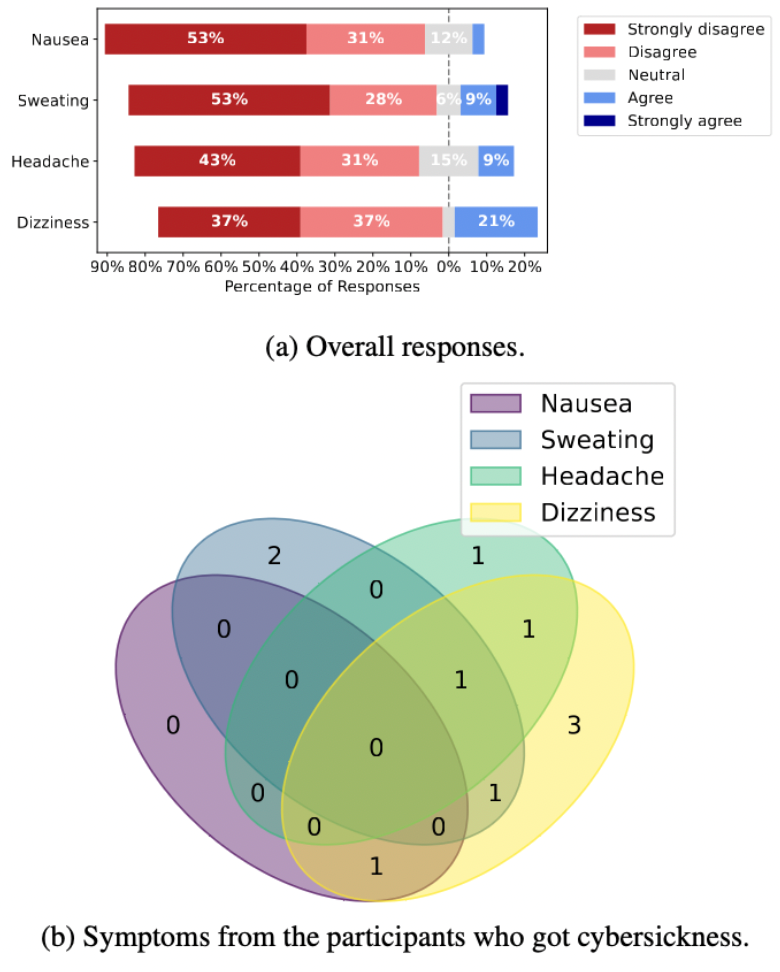Radu Prodan/ITEC will organise the CERCIRAS Training School (on behalf of COST Action CA19135) from August 26 – 30, 2024 at the University of Klagenfurt. Details and programs will be available soon.
With the current popularity of ECO in the Asia–Pacific (APAC), the Bitmovin team in APAC, led by Adrian Britton, expressed an interest in the energy-aware research initiatives conducted within the GAIA project in Austria. Following an introductory meeting between the APAC team and AAU on October 17, 2023, both teams decided to meet in person on November 21, 2023, to explore the topics further.
The meeting proved to be highly productive, centering around two recent research topics:
– VE-Match: Video Encoding Matching-Based Model in the Cloud and Edge (presented by Samira Afzal & Narges Mehran)
– Energy-aware Spatial and Temporal Resolution Selection for Per-Title (presented by Mohammad Ghasempour & Hadi Amirpour)
Many interesting Q&As appeared during each presentation due to customer and provider requirements and the future insight of climate-friendly video streaming in the Cloud and Edge. The fruitful discussions opened up avenues for future exploration in this dynamic field.
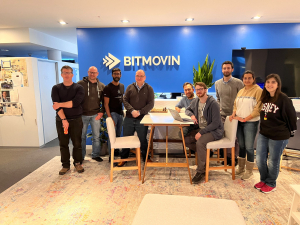
On the 18th of November, 2023, Sebastian held a talk about his game development story, Fire Totem Games, A Webbing Journey, and the Austrian game development scene at the first Austrian Game Dev Night in Warsaw.
Benjamin Hanussek, a Game Studies and Engineering alumni, initialized the idea for the event. Frederic Schulte organized it from the Austrian Cultural Forum Warsaw and the PJAIT Game Lab, which Benjamin leads.
The event took place in the Austrian Cultural Forum in Warsaw, and visitors were able to play A Webbing Journey and Primal Fray, a game developed by Tymoteusz Pietruszka, a Polish game developer, during the day. In the evening, Sebastian held his talk, followed by a Q&A session and ended with many valuable new connections to the Polish game development scene. The event was a big success and laid the foundation for future Austrian Game Dev Nights.
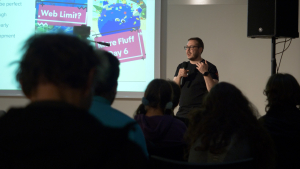
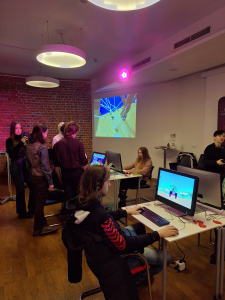
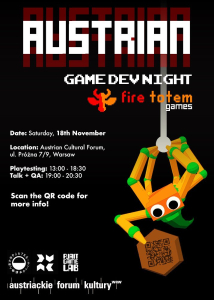
We’re excited to share that the ACM Special Interest Group in Multimedia (SIGMM) presents to
Stefan Lederer, Christopher Müller, and Christian Timmerer
The SIGMM Test of Time Paper Honorable Mention in the category of “MM Systems & Networking”
for their paper “Dynamic Adaptive Streaming over HTTP Dataset”. In Proceedings of the 3rd Multimedia Systems Conference, MMSys ’12, page 89–94, New York, NY, USA, 2012. ACM. doi:10.1145/2155555.2155570
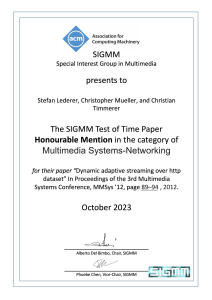
IEEE Transactions on Network and Service Management
Authors: Reza Farahani, Ekrem Cetinkaya, Christian Timmerer, Mohammad Shojafar, Mohammad Ghanbari, and Hermann Hellwagner
Abstract: Recent years have witnessed video streaming demands evolve into one of the most popular Internet applications. With the ever-increasing personalized demands for high-definition and low-latency video streaming services, network-assisted video streaming schemes employing modern networking paradigms have become a promising complementary solution in the HTTP Adaptive Streaming (HAS) context. The emergence of such techniques addresses long-standing challenges of enhancing users’ Quality of Experience (QoE), end-to-end (E2E) latency, as well as network utilization. However, designing a cost-effective, scalable, and flexible network-assisted video streaming architecture that supports the aforementioned requirements for live streaming services is still an open challenge. This article leverage novel networking paradigms, i.e., edge computing and Network Function Virtualization (NFV), and promising video solutions, i.e., HAS, Video Super-Resolution (SR), and Distributed Video Transcoding (TR), to introduce A Latency- and cost-aware hybrId P2P-CDN framework for liVe video strEaming (ALIVE). We first introduce the ALIVE multi-layer architecture and design an action tree that considers all feasible resources (i.e., storage, computation, and bandwidth) provided by peers, edge, and CDN servers for serving peer requests with acceptable latency and quality. We then formulate the problem as a Mixed Integer Linear Programming (MILP) optimization model executed at the edge of the network. To alleviate the optimization model’s high time complexity, we propose a lightweight heuristic, namely, Greedy-Based Algorithm (GBA). Finally, we (i) design and instantiate a large-scale cloud-based testbed including 350 HAS players, (ii) deploy ALIVE on it, and (iii) conduct a series of experiments to evaluate the performance of ALIVE in various scenarios. Experimental results indicate that ALIVE (i) improves the users’ QoE by at least 22%, (ii) decreases incurred cost of the streaming service provider by at least 34%, (iii) shortens clients’ serving latency by at least 40%, (iv) enhances edge server energy consumption by at least 31%, and (v) reduces backhaul bandwidth usage by at least 24% compared to baseline approaches.
Keywords: HTTP Adaptive Streaming (HAS); Edge Com- puting; Network Function Virtualization (NFV); Content Deliv- ery Network (CDN); Peer-to-Peer (P2P); Quality of Experience (QoE); Video Transcoding; Video Super-Resolution.
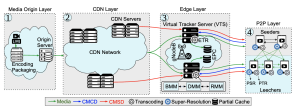
Radu Prodan participated on November 1, 2023, as an external opponent at the PhD defense of Ruyue Xin ((Title of the dissertation: Towards Effective Performance Diagnosis for Distributed Applications), supervised by Dr. Zhiming Zhao, Dr. Paola Grosso and Prof. Cees de Laat at the University of Amsterdam, Netherlands.
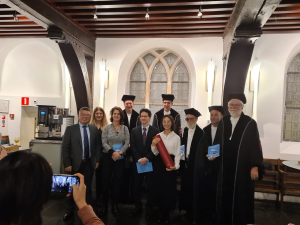
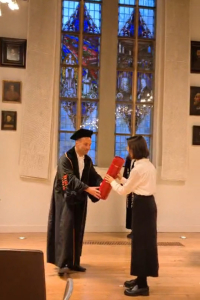
The Graph Massivizer Project is part of the European Big Data Value Forum!
The team participates in a session exploring the latest in #KnowledgeGraph technology with real-world use cases in agrifood, industry 4.0 and healthcare. As part of the session, metaphacts GmbH founder Peter Haase will discuss the importance of knowledge graphs as a foundational layer for #AI applications.
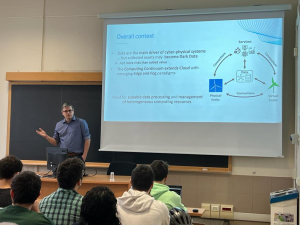
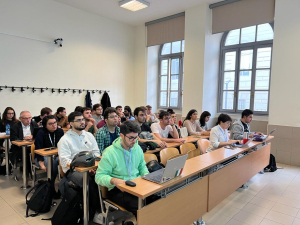


The Symposium “The Data Science and Artificial Intelligence (DSAI) carnival” took place on the 19th of October 2023 at the Wageningen University & Research Campus and was organized in collaboration with the Wageningen Data Competence Center (WDCC).
This symposium provided an in-depth examination of cutting-edge themes from areas such as the Web, Semantic Web, linked data and knowledge graphs, LLMs, MLOps, cloud computing, data infrastructures and data space, FAIR data management, and related developments.
Leading experts shared the latest research and applications in these areas, fostering collaboration and offering insights into emerging trends.
The event concluded with the inaugural lecture of Prof. Dr. Anna Fensel.
IEEE Access, A Multidisciplinary, Open-access Journal of the IEEE
Title: Characterization of the Quality of Experience and Immersion of Point Cloud Video Sequences through a Subjective Study @ IEEE Access
Authors: Minh Nguyen, Shivi Vats, Sam Van Damme (Ghent University – imec and KU Leuven, Belgium), Jeroen van der Hooft (Ghent University – imec, Belgium), Maria Torres Vega (Ghent University – imec and KU Leuven, Belgium), Tim Wauters (Ghent University – imec, Belgium), Filip De Turck (Ghent University – imec, Belgium), Christian Timmerer, Hermann Hellwagner
Abstract: Point cloud streaming has recently attracted research attention as it has the potential to provide six degrees of freedom movement, which is essential for truly immersive media. The transmission of point clouds requires high-bandwidth connections, and adaptive streaming is a promising solution to cope with fluctuating bandwidth conditions. Thus, understanding the impact of different factors in adaptive streaming on the Quality of Experience (QoE) becomes fundamental. Point clouds have been evaluated in Virtual Reality (VR), where viewers are completely immersed in a virtual environment. Augmented Reality (AR) is a novel technology and has recently become popular, yet quality evaluations of point clouds in AR environments are still limited to static images.
In this paper, we perform a subjective study of four impact factors on the QoE of point cloud video sequences in AR conditions, including encoding parameters (quantization parameters, QPs), quality switches, viewing distance, and content characteristics. The experimental results show that these factors significantly impact the QoE. The QoE decreases if the sequence is encoded at high QPs and/or switches to lower quality and/or is viewed at a shorter distance, and vice versa. Additionally, the results indicate that the end user is not able to distinguish the quality differences between two quality levels at a specific (high) viewing distance. An intermediate-quality point cloud encoded at geometry QP (G-QP) 24 and texture QP (T-QP) 32 and viewed at 2.5 m can have a QoE (i.e., score 6.5 out of 10) comparable to a high-quality point cloud encoded at 16 and 22 for G-QP and T-QP, respectively, and viewed at a distance of 5 m. Regarding content characteristics, objects with lower contrast can yield better quality scores. Participants’ responses reveal that the visual quality of point clouds has not yet reached an immersion level as desired. The average QoE of the highest visual quality is less than 8 out of 10. There is also a good correlation between objective metrics (e.g., color Peak Signal-to-Noise Ratio (PSNR) and geometry PSNR) and the QoE score. Especially the Pearson correlation coefficients of color PSNR is 0.84. Finally, we found that machine learning models are able to accurately predict the QoE of point clouds in AR environments.
The subjective test results and questionnaire responses are available on Github: https://github.com/minhkstn/QoE-and-Immersion-of-Dynamic-Point-Cloud.
